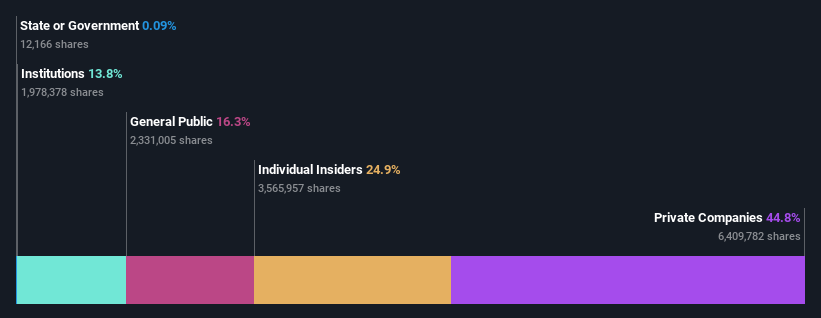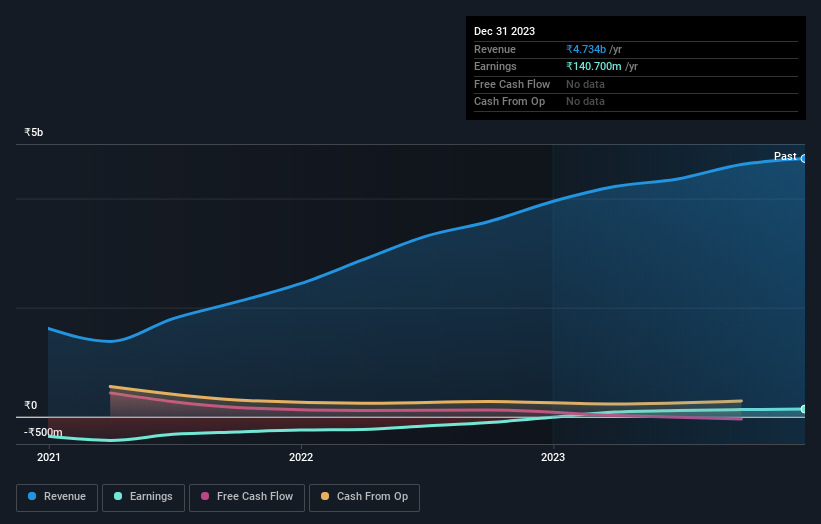- India
- /
- Commercial Services
- /
- NSEI:REPRO
Repro India Limited's (NSE:REPRO) market cap up ₹1.3b last week, benefiting both private companies who own 45% as well as insiders

Key Insights
- The considerable ownership by private companies in Repro India indicates that they collectively have a greater say in management and business strategy
- 54% of the business is held by the top 4 shareholders
- Insider ownership in Repro India is 25%
A look at the shareholders of Repro India Limited (NSE:REPRO) can tell us which group is most powerful. We can see that private companies own the lion's share in the company with 45% ownership. That is, the group stands to benefit the most if the stock rises (or lose the most if there is a downturn).
While private companies were the group that benefitted the most from last week’s ₹1.3b market cap gain, insiders too had a 25% share in those profits.
Let's delve deeper into each type of owner of Repro India, beginning with the chart below.
Check out our latest analysis for Repro India

What Does The Institutional Ownership Tell Us About Repro India?
Institutions typically measure themselves against a benchmark when reporting to their own investors, so they often become more enthusiastic about a stock once it's included in a major index. We would expect most companies to have some institutions on the register, especially if they are growing.
Repro India already has institutions on the share registry. Indeed, they own a respectable stake in the company. This can indicate that the company has a certain degree of credibility in the investment community. However, it is best to be wary of relying on the supposed validation that comes with institutional investors. They too, get it wrong sometimes. When multiple institutions own a stock, there's always a risk that they are in a 'crowded trade'. When such a trade goes wrong, multiple parties may compete to sell stock fast. This risk is higher in a company without a history of growth. You can see Repro India's historic earnings and revenue below, but keep in mind there's always more to the story.

Repro India is not owned by hedge funds. Looking at our data, we can see that the largest shareholder is Reproductions Pvt. Ltd. with 39% of shares outstanding. In comparison, the second and third largest shareholders hold about 6.3% and 4.6% of the stock. Furthermore, CEO Sanjeev Vohra is the owner of 2.3% of the company's shares.
To make our study more interesting, we found that the top 4 shareholders control more than half of the company which implies that this group has considerable sway over the company's decision-making.
While it makes sense to study institutional ownership data for a company, it also makes sense to study analyst sentiments to know which way the wind is blowing. As far as we can tell there isn't analyst coverage of the company, so it is probably flying under the radar.
Insider Ownership Of Repro India
The definition of company insiders can be subjective and does vary between jurisdictions. Our data reflects individual insiders, capturing board members at the very least. Management ultimately answers to the board. However, it is not uncommon for managers to be executive board members, especially if they are a founder or the CEO.
Insider ownership is positive when it signals leadership are thinking like the true owners of the company. However, high insider ownership can also give immense power to a small group within the company. This can be negative in some circumstances.
Our most recent data indicates that insiders own a reasonable proportion of Repro India Limited. It has a market capitalization of just ₹12b, and insiders have ₹3.0b worth of shares in their own names. We would say this shows alignment with shareholders, but it is worth noting that the company is still quite small; some insiders may have founded the business. You can click here to see if those insiders have been buying or selling.
General Public Ownership
With a 16% ownership, the general public, mostly comprising of individual investors, have some degree of sway over Repro India. While this size of ownership may not be enough to sway a policy decision in their favour, they can still make a collective impact on company policies.
Private Company Ownership
It seems that Private Companies own 45%, of the Repro India stock. It's hard to draw any conclusions from this fact alone, so its worth looking into who owns those private companies. Sometimes insiders or other related parties have an interest in shares in a public company through a separate private company.
Next Steps:
It's always worth thinking about the different groups who own shares in a company. But to understand Repro India better, we need to consider many other factors. Be aware that Repro India is showing 3 warning signs in our investment analysis , and 1 of those can't be ignored...
If you would prefer check out another company -- one with potentially superior financials -- then do not miss this free list of interesting companies, backed by strong financial data.
NB: Figures in this article are calculated using data from the last twelve months, which refer to the 12-month period ending on the last date of the month the financial statement is dated. This may not be consistent with full year annual report figures.
New: AI Stock Screener & Alerts
Our new AI Stock Screener scans the market every day to uncover opportunities.
• Dividend Powerhouses (3%+ Yield)
• Undervalued Small Caps with Insider Buying
• High growth Tech and AI Companies
Or build your own from over 50 metrics.
Have feedback on this article? Concerned about the content? Get in touch with us directly. Alternatively, email editorial-team (at) simplywallst.com.
This article by Simply Wall St is general in nature. We provide commentary based on historical data and analyst forecasts only using an unbiased methodology and our articles are not intended to be financial advice. It does not constitute a recommendation to buy or sell any stock, and does not take account of your objectives, or your financial situation. We aim to bring you long-term focused analysis driven by fundamental data. Note that our analysis may not factor in the latest price-sensitive company announcements or qualitative material. Simply Wall St has no position in any stocks mentioned.
About NSEI:REPRO
Excellent balance sheet with questionable track record.


